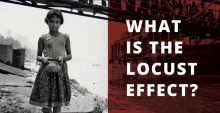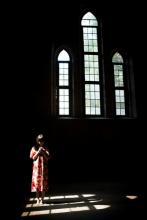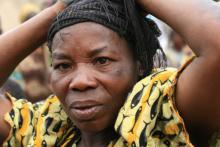rape as a weapon of war

Caleb is a father in Africa. He works hard as a night watchman, and he and his wife save from their small income with the dream of sending their daughter to college. But the family’s dreams are destroyed when the police arrest Caleb on a random sweep for a robbery he had nothing to do with. This is not to say that the evidence against him was flimsy; there is no evidence against him whatsoever. The police needed to show an arrest had been made, and Caleb was an easy target … because he was poor.
Once in police custody, Caleb is viciously beaten. He is shaken down for bribes. And then, he is thrown in jail and charged with a capital offense. He is given no indication of when he might have a chance to prove his innocence – and even if he were, Caleb can’t afford a lawyer to help him. His family struggles to hang on without him.
What is perhaps most stunning about Caleb’s story is not the brutality (though it certainly is brutal), the singular unfairness of it all (though it is dramatically and utterly unjust), the hopelessness (though the story is obviously devastating). No, what is most stunning is just how ordinary Caleb’s story is.

Sojourners is offering an important opportunity for Christian churches to examine their attitudes towards women. Following up on an article by Michelle A. Gonzalez entitled “Breaking the Habits of Machismo,” Gonzalez and Jim Wallis, president of Sojourners, will conduct a live video discussion on Wednesday, Feb. 12 to “discuss what the Bible really says to encourage, affirm, and empower women and girls in their call to be leaders.”
Judging from Gonzalez’s article, this conversation will focus on what it means to affirm that both men and women are created in God’s image. She begins her article with the Common English Bible translation of Genesis 1:27: “God created humanity in God’s own image, in the divine image God created them, male and female God created them.” Though she points to important changes taking place in Christianity today, Gonzalez traces the legacy of Christian thinking on womanhood that has elevated men and devalued women, instilling “habits of machismo” in our churches and our culture that are difficult to break.
But break them we must, Gonzalez argues, if we want to free both our theology and our practice from “male-oriented power structures.” Amen, sister. Because this is about more than equal employment opportunities for women in church administrative structures, of whether we are allowed to “preach, lead from the altar, celebrate communion, administer rites, pastor congregations, or teach.” What’s at stake in this conversation is whether Christians — and I think this is a call to American Christians in particular — whether American Christians are willing to dismantle a long-held justification for violence against women, not just in our country, but around the world. Gonzalez herself points out that patriarchal “attitudes can lead to greater violence against women, such as we see in the increasing exploitation and attacks on young women and how social media is used to perpetuate and document these horrific acts,” but this is her only nod to the issue of gender-based violence. Let’s add to the picture a look at the violence perpetrated by men against female bodies that has become to typify conflict zones around the world.

I can still see in my mind’s eye the vibrantly colored wraps draping the hundreds of displaced women I met at Joborona Camp in Northern Sudan. The stories they told, of blazing huts in Southern Sudan and their men burning alive inside; of their boys forced to fight and kill at ages as young as six or seven; and of their girls taken and forced into sexual slavery seemed impossible to be true. Yet I heard them again and again.
And if these stories weren’t horrific enough, it was the stories the women chose not to share that haunt me the most. Their empty eyes and void expressions told me all I needed to know.
I know empty eyes. I have gazed into them in Bosnia and Croatia. I remember Rwanda, Sierra Leone, and Liberia. I have witnessed them in the Democratic Republic of the Congo — where it is believed that one million girls and women have stories to tell of the gender-based violence they have endured. I have been confronted by the eyes of our sisters from Darfur, who risk their dignity, their bodies, and in some cases their very lives by leaving their refugee camps to collect firewood for their small cooking stoves (those who are lucky enough to have one). It is in the bush, often, that they are victims of sexual and gender-based violence. These are the countless women who risk being raped so their children can eat.
The season of Advent always invites me to contemplate many facets of Christianity: the contrast between what God extols versus the world's values, the power of patience, and the strength of hope. While important in all times and places, each of these themes can especially speak this year to the current situation in Sudan.